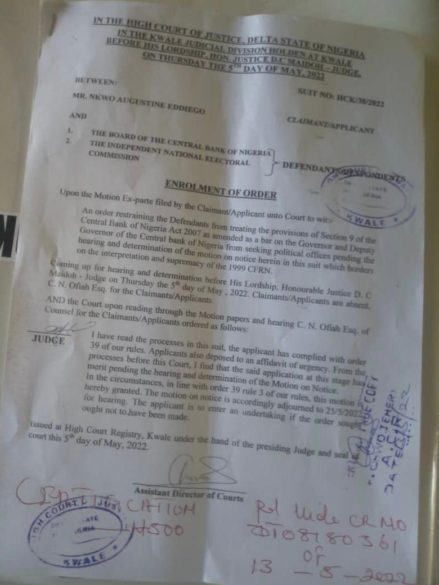


“You Cannot Stop Emefiele From Running for President” Court Tells INEC, CBN.
The CBN Governor approached the court on May 5, 2022,to obtain an order to enable him to stay in office while contesting for the Presidency, and the judgement was granted on Thursday, May 12.
Justice DC Maidoh in a judgement delivered on May 5 granted the order and adjourned the case to May 25.

“In the circumstances, in line with order 39 rule 3 of our rules, this motion is hereby granted. The motion on notice is accordingly adjourned to 25/5/2022 for hearing,” the judge said.
“The court upon reading through the motion papers and hearing C.N. Ofiah Esq. for the claimants/applicants ordered as follows: I have read the processes in this suit, the applicant has complied with order 39 of our rules.
“Applicants also deposed to an affidavit of urgency. From the processes before this court, I find that the said application at this stage has merit pending the hearing and determination of the motion on notice.
“In the circumstances, in line with order 39 rule 3 of our rules, this motion is hereby granted. The motion on notice is accordingly adjourned to 25/5/2022 for hearing. The applicant is to enter undertaking if the order sought ought not to have been made.”

Protesting Students Barricade Major Highways in Enugu and Ife
Students under the aegis of Fund Education Coalition have taken protests to some Federal highways in the Southern parts of Nigeria. Students of Obafemi Awolowo University, Ile-Ife, Osun State, and their counterparts at University of Nigeria, Nsukka, Enugu State, yesterday took to the highways, stopping vehicular movements in protest against the continous strike embarked upon by the Academic Staff Union of Universities, ASUU.
While the OAU students barricaded the Ife-Ibadan expressway, students of the University of Nigeria, shutdown the Nsukka-Opi-Enugu, where travellers remained stranded as the blockade caused traffic snarls.
The students, vowed to continue the protests till their demand of addressing issues raised by ASUU and reopening universities was met by the Federal Government. Their uniform demand being an immediate end to the strike embarked upon by ASUU.
The visibly angry students, who turned out in their hundreds, accused the Federal Government and ASUU of toying with their future, threatening that they would cripple economic and political activities nationwide, if the strike was not called off.
The students, who said they were tired of staying idle at home, urged politicians to inject the huge sums of money used in purchasing nomination forms into resolving the impasse between ASUU and Federal Government.

INEC Reports 1.4m Invalid Online Registration
The Independent Electoral Commission has declared that 1,126,359 out of 2,523,458 Permanent Voters Cards registered online between June and December 2021 are invalid.
Professor Sa’idu Babura,The Resident Electoral Commissioner in charge of Zamfara State noted this while speaking to journalists in his office in Gusau on Thursday.
Babura said, “After the authentication exercise, it was discovered that out of the 2,523,458 registrants nationwide, 1,390,519 are valid while 1,126,359 are invalid.
“This means that 44.6% of all those registered between June and December 2021 are multiple registrations.”
He decried the poor response of Nigerians to the ongoing Voter Registration exercise which ends on June 30, 2022.







